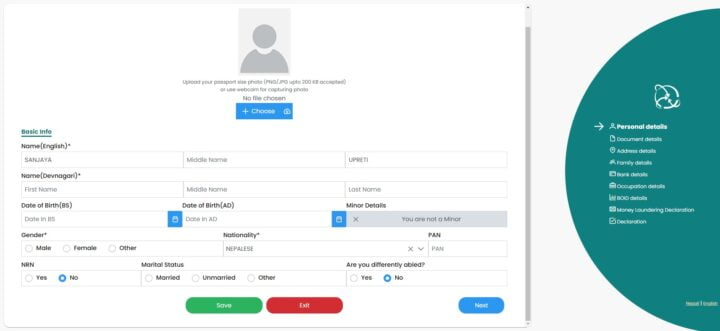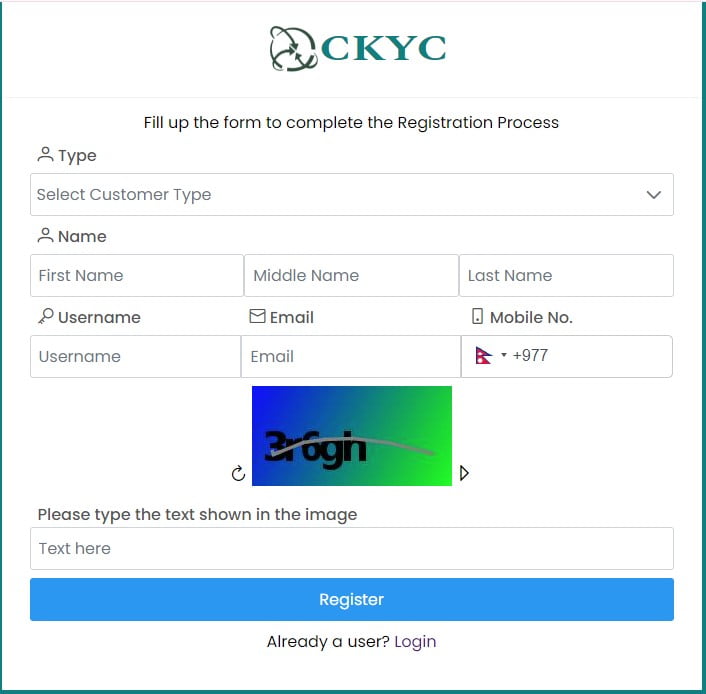
CKYC (Central Know Your Customer) is a central repository for KYC (Know Your Customer) records of customers in the financial sector. It aims to provide uniform KYC norms and eliminate duplication of KYC efforts across financial institutions. While CKYC is primarily an initiative of the Indian government, similar concepts and frameworks can be found or implemented in other countries, including Nepal.
In Nepal, the concept of KYC is governed by the Nepal Rastra Bank (NRB), the central bank of Nepal, through its regulations for Anti-Money Laundering (AML) and Combating the Financing of Terrorism (CFT). Here are the key points regarding KYC and potential CKYC implementation in Nepal:
- Regulatory Framework: The Nepal Rastra Bank mandates that all financial institutions follow strict KYC norms to ensure the customer’s authenticity and prevent illegal activities.
- KYC Requirements: Nepalese financial institutions must collect and verify various customer documents. This includes proof of identity, address, and, in some cases, information about the source of funds.
- Technology and Systems: Nepal may not have a centralized CKYC system like India’s, but the NRB has enhanced the technological infrastructure to support more efficient KYC processes. This includes the use of digital KYC (e-KYC) systems.
- Anti-Money Laundering: Nepal’s AML regulations are aligned with international standards, which require robust KYC processes. Financial institutions must report any suspicious transactions to Nepal’s Financial Information Unit (FIU).
- Potential for CKYC: Given the benefits of a centralized KYC repository, Nepal might explore the development of a CKYC-like system in the future to streamline KYC processes across various financial institutions.
In conclusion, while Nepal does not have a CKYC system identical to India’s, it does have stringent KYC regulations enforced by the Nepal Rastra Bank. The development of a centralized KYC system could be a future step to enhance efficiency and reduce redundancy in KYC processes across the financial sector in Nepal.
CKYC in Nepal: Frequently Asked Questions (FAQ)
1. What is CKYC?
CKYC (Central Know Your Customer) is a centralized repository for KYC records of financial sector customers. It aims to streamline the KYC process, reduce duplication, and ensure a uniform standard across all financial institutions.
2. Does Nepal have a CKYC system?
Nepal does not currently have a centralized CKYC system like India. However, there are discussions and potential plans to develop such a system.
3. What is the current KYC process in Nepal?
The current KYC process in Nepal involves the following steps:
- Customer onboarding with a KYC form.
- Submission of identity and address proofs.
- In-person verification at the financial institution.
- Document and background verification.
- Risk profiling and account activation.
- Ongoing transaction monitoring and periodic KYC updates.
- Reporting suspicious transactions to the Financial Information Unit (FIU).
4. What documents are required for KYC in Nepal?
For KYC in Nepal, customers typically need to provide:
- Proof of Identity: Citizenship certificate, passport, or driving license.
- Proof of Address: Utility bill, bank statement, or rental agreement.
5. Why is KYC important?
KYC is crucial for:
- Verifying the identity of customers.
- Preventing money laundering and financial fraud.
- Ensuring compliance with legal and regulatory requirements.
- Safeguarding financial institutions from illicit activities.
6. What are the benefits of a CKYC system?
A CKYC system offers several benefits:
- Efficiency: Streamlines the KYC process across institutions.
- Cost Reduction: Eliminates redundancy and reduces administrative costs.
- Standardization: Ensures uniform KYC norms.
- Convenience: Simplifies account opening for customers by reducing repetitive documentation.
7. How does CKYC enhance customer convenience?
With CKYC, once a customer completes KYC with one institution, their KYC details are stored in a central repository. Other financial institutions can access this information, making it easier for customers to open new accounts or avail of financial services without resubmitting documents.
8. How is customer data protected in CKYC?
A CKYC system ensures robust data protection through:
- Secure storage of KYC records.
- Controlled access to customer data.
- Compliance with data protection regulations to ensure privacy and security.
9. What steps is Nepal taking towards CKYC implementation?
To move towards CKYC, Nepal is considering:
- Establishing a centralized KYC repository.
- Implementing digital KYC (e-KYC) processes.
- Developing inter-institutional data sharing protocols.
- Updating regulatory frameworks to support CKYC.
- Investing in technology infrastructure.
- Training financial institution staff and educating customers.
10. What is e-KYC, and how does it differ from traditional KYC?
e-KYC (electronic KYC) is the digital version of KYC, allowing for online verification of identity and address using digital documents and biometric authentication. It differs from traditional KYC, which requires physical document submission and in-person verification.
11. Who regulates KYC and potential CKYC in Nepal?
The Nepal Rastra Bank (NRB), the central bank of Nepal, regulates KYC processes and will likely oversee the development and implementation of a CKYC system, ensuring compliance with AML/CFT standards.
By understanding these FAQs, customers and financial institutions in Nepal can better navigate the current KYC landscape and anticipate the potential benefits and changes brought by a future CKYC system.

